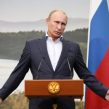
PUTIN’S FIGHT AGAINST CORRUPTION RESEMBLES MATRYOSHKA DOLL
Publication: Eurasia Daily Monitor Volume: 3 Issue: 99
By:

The political buzz in Moscow in recent weeks has surrounded corruption, which, according to Prosecutor General Vladimir Ustinov, “has acquired the character of a national threat” (Vremya novostei, May 16). No new data have emerged on the scale of this phenomenon, and in the latest Corruption Perception Index compiled by Transparency International, Russia still sits quietly in 126th place, between Niger and Sierra Leone.
The trigger for the new campaign was a phrase Putin used in the opening of his May 10 address to the parliament: “Despite all of the efforts we have made, we have still not yet managed to remove one of the greatest obstacles facing our development, that of corruption.” The proposition was rather feeble and the quote from Franklin Delano Roosevelt — on stepping on toes of those “comparative few who seek to retain or to gain position or riches or both by some short cut that is harmful to the greater good” — added an unusual twist, but not much force. Nevertheless, Prime Minister Mikhail Fradkov, always attuned to signals from the Kremlin, immediately promised to take all necessary measures and show no mercy in “exterminating this evil” (Newsru.com, May 11). Then several mid-level officers from the Ministry of the Interior, the Customs Service, the Prosecutor’s Office, and, most remarkably, the FSB were sacked. More extra-tough anti-corruption measures were promised, but on the closer look this sudden escalation of the eternal struggle involves several different policies and campaigns packed one inside another like a Russian matryoshka-doll.
The outer layer, the most elaborately decorated one, is a PR exercise where state-controlled TV channels provide calibrated spin for high-level state officials eager to demonstrate their zeal in implementing the president’s orders. Picking a fight against corruption is always popular with the public, and the previous campaign, back in mid-2003, against “turncoats” or “werewolves” in the Ministry of Interior registered positively. The problem here is that, despite all propaganda efforts, the Russians are losing faith in this cause. In a new poll conducted by Ekho Moskvy radio (May 15), 93% expressed the opinion that Putin was not serious about that fight.
The next layer represents Putin’s efforts at strengthening discipline in the vast Russian bureaucracy by activating the “fear factor.” He has good reason to be irritated with the pattern whereby everybody around him is eager to agree with every word he says — but it is impossible to get anything done. In the speech, Putin offered an interesting variation on the theme, reminding state officials about their “social responsibility” (Expert, May 15). That cliché had been previously applied to entrepreneurs as a means to force them to make contributions to various “good causes,” such as the pro-Kremlin United Russia political party. Now the bureaucrats, who, according to Minister of Economic Development German Gref, are engaged in a “Bacchanalia” of confiscation of private businesses, are expected to demonstrate similar “philanthropic” activities (Vremya novostei, May 19).
The third layer constitutes a special case; namely, the grotesque forms of corruption in the Russian Customs Service (Ezhednevny zhurnal, May 17). In April, Putin expressed extreme irritation about the de-facto privatization of the customs sphere, where smart officials and entrepreneurs “merged in ecstasy” (Moscow News, April 21). The real source of that irritation was the fierce struggle between several semi-officials “clans” for control of the customs business, worth billions of U.S. dollars. Now, with the appointment of the new head of the Customs Service, who will answer directly to Fradkov, this struggle appears to be over and the winning clan has consolidated its monopoly with the sacking of the competitors compromised as insufficiently loyal to their minders in the FSB (Ekho Moskvy, May 17).
The fourth layer was appended to this “complex struggle” to add a regional dimension. Official letters were sent to four regions requesting the recall of their representatives to the Federation Council; no explanation was provided, but corruption was implied by combining this demarche in one “news item” with other reshuffles. The reaction, however, was not exactly to Moscow’s liking: First the parliament of Khakassiya refused to recall its “senator,” and then the parliament of the Nenets okrug followed suit (Vedomosti, May 19). The federal center decided to raise the stakes and hit back with a criminal case against Alexei Barinov, the governor of the second mutinous “subject” (Kommersant, May 20). Other regions may join this tug-of-war with their particular grievances, but corruption appears to be just a smoke screen for these complicated intrigues.
The fifth and most secretive layer consists of the reshufflings in the FSB where two generals from the department for the protection of constitutional order and the struggle against terrorism were sacked (Novaya gazeta, May 15). Nikolai Patrushev, the director of the FSB, proudly reported last week on the impressive achievements in the war against terror, but the good PR was spoiled by a series of ambushes in Chechnya, clashes in Dagestan, and the assassination of a Deputy Minister of Interior in Ingushetia (Ezhednevny zhurnal, May 19; see EDM, May 19). The blame was duly allocated to those who cannot produce tangible arguments in their defense, but corruption was merely a cover-up for the increasingly bitter internal squabbles in the all-powerful “special service.”
In a traditional Russian matryoshka doll, the smallest figure is solid, but in Putin’s fight against corruption, beneath all the layers there appears to be just emptiness. In his overgrown state machine, which expanded by some 11% last year, corruption is not a side effect; it is the very mode of existence. The state spreads in every direction from its “commanding heights” in the economy by legalizing bureaucratic extortion and it asserts its dominance over society by monopolizing the distribution of the petro-ruble pot. The corrupt appetites are growing even faster than the oil revenues, and Putin’s dietary prescriptions could not make even the slightest impression on the obesity of his predatory system.




